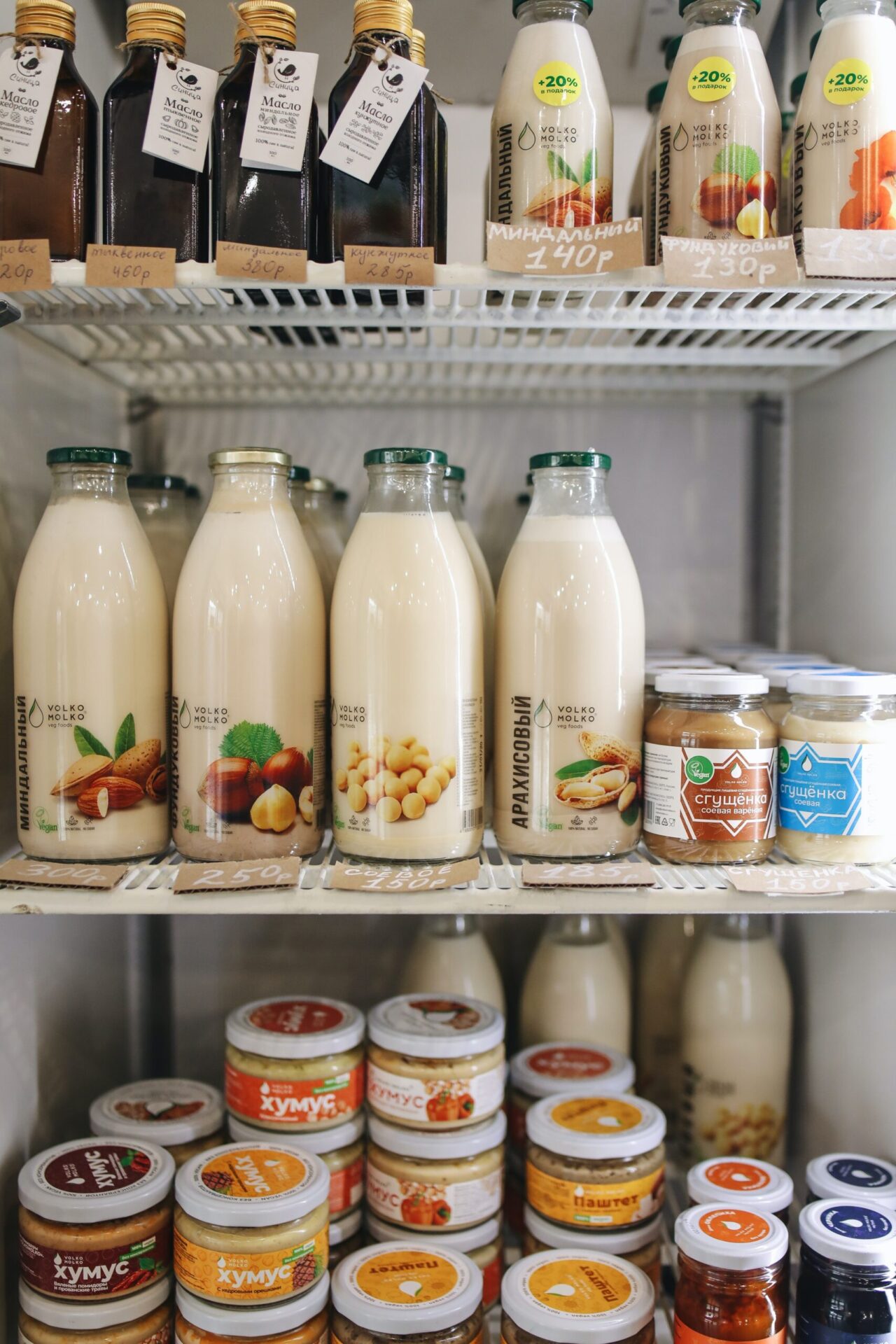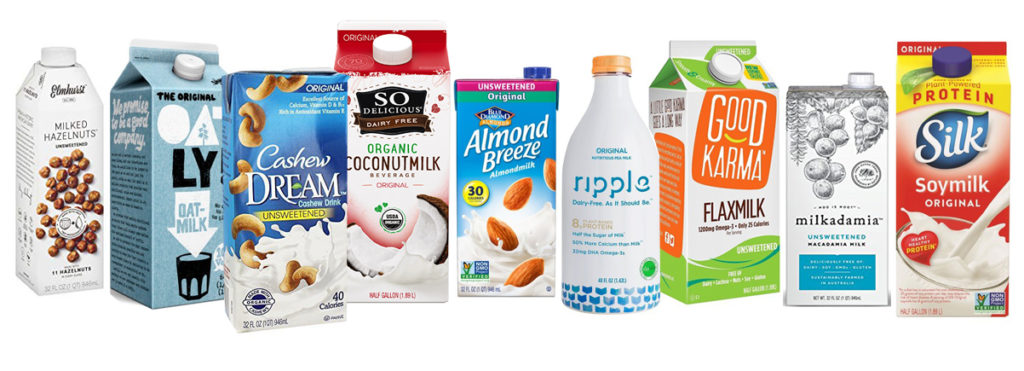
Plant based milk products
Plant Based Milk: Your Best Investing Option. The plant-based milk market is expected to grow from $27.3 billion in 2022 to $123.2 billion in 2029. A recent research report released by Data Bridge Market Research estimates the plant-based milk market to reach US$ 123.2 billion by 2029.
Incidentally, 22 August 2022 was World Plant Milk Day. In 2017, Robbie Lockie, a co-founder of Plant Based News, established World Plant Milk Day. In 2018, PBN and ProVeg joined together to create the day, with the goal of inspiring millions of people worldwide to transition from dairy milk to plant-based alternatives.
What is Plant-Based Milk?
Plant milk is a beverage made from plants that resemble milk in color. Plant milk is a non-dairy beverage that is flavored and scented with water-based plant extracts. Plant milk is used as a milk substitute and frequently has a creamy texture on the tongue. There are different kinds of plant milk; the most popular ones worldwide are almond, oat, soy, and coconut.
Vegan milk or Plant Milk has been used as a beverage and a flavorful element in sweet and savory foods across a variety of civilizations, such as the usage of coconut milk in curries. It is suitable for vegan and vegetarian diets. Additionally, plant milks are utilized to create dairy-free cheese, soy yogurt, vegan cheese, and ice cream substitutes.
They are now usually referred to as vegan milk, plant-based milk, alternative milk, or non-dairy milk. Plant-based beverages are frequently packaged in containers that are comparable to and cost-effective with those used for dairy milk for commercial purposes. However, they are not permitted to bear the term “milk” in the EU. Source: Wikipedia
Major Players in Plant Milk Market

Some of the major players operating in the plant-based milk market are:
- Bayer AG (Germany)
- Abbott (U.S.)
- DSM (Netherlands)
- DuPont. (U.S.)
- Amway (U.S.)
- The Nature’s Bounty Co. (U.S.)
- GlaxoSmithKline plc. (U.K.)
- Nestlé SA (Switzerland)
- RiceBran Technologies (U.S.)
- Mead Johnson & Company, LLC. (U.S.)
- Premier Nutrition Corporation (U.S.)
- U.S. Spice Mills, Inc. (U.S.)
- Health Milk Manufacturers’ Association (U.K.)
- Glanbia PLC (Ireland)
- Herbalife International of America, Inc. (U.S.)
- Bionova (India)
Nutritional Value of Plant Milk
The nutritional advantages of plant-based dairy substitutes, such as lower cholesterol levels, enhanced cardiovascular health, and diabetes management, have increased their use. A popular food that is high in protein, fiber, and omega-3 fatty acids is soy milk.
Soy Milk contains isoflavones with anticancer and antiestrogenic effects. Dairy-alternative milks often have less fat, calories, and water for improved hydration. Some products are also enriched with additional vitamins and nutrients. Dairy substitutes that are low in carbohydrates and fat help people lose weight. Such health advantages aid in the expansion of the dairy substitute business.
Best Investment Option
Following is the summary of a Market Research Report on Dairy Alternatives Market by MarketsAndMarkets
As the world’s population rises, the demand on limited resources increases. Low-income consumers are impacted by increased food prices due to high energy prices and growing raw material costs. Water scarcity is adding to the pressure on the food supply, especially in Africa and Northern Asia. Additionally, Asia Pacific offers lower production and processing costs. Dairy substitute providers and producers will be better able to target this market thanks to the high demand and low production costs.
People have begun converting to nutrient-dense and healthful variations of food items as a result of their quickly changing lives. As consumers look for quick and convenient healthy options, fast food is predicted to progressively distance itself from junk food. Finding foods with naturally high nutritional values may be a significant business opportunity for producers and suppliers. In addition to this, the rising disposable incomes in the Asia Pacific region are boosting the need for quick-to-use, nutritional, and healthy products. The dairy alternative market has a lot of prospects in developing countries.
The lack of consumer knowledge about the nutritional advantages of dairy alternatives is a barrier to the market’s expansion. Some dairy users believe that dairy alternatives have a lower nutritional value than cow’s milk and fewer important elements.
Due to their ignorance of the nutrition offered by dairy replacement products and the lack of efforts made to educate them, such fallacies are particularly common among consumers in undeveloped and developing nations. This problem can be solved, though, by properly promoting plant-based beverages and informing consumers about their health advantages.
Although not related to plant-based milk, A Hot Selling Low Carb Recipe menu is available at our stores.

Recipe Book – 350 Low-Carb Recipes
All of us love carbs. For some of us, love is an understatement.
But these days, we’re all told we need to reduce the number
of carbs in our diet.
If you’re one of those people, this low-carb recipe book is for you!
We’ve got recipes for everything from breakfast to dessert, so you’ll never be bored with your low-carb diet again!
Predictions on the Growth of Plant Milk Industry
Highlights of DataBridge Market Analysis
According to estimates, North America holds the biggest market share for plant-based milk. Due to a number of factors, including rising health consciousness, a well-established milk sector, and faster acceptance of technology improvements in the milk and beverage industries, North America currently holds the top spot in the global market for plant-based milk.
The Asia-Pacific market is forecast to grow rapidly in the future. The high market growth in the Asia-Pacific region can be attributed to elements like increased use of cutting-edge technologies for product innovation, partnerships between domestic and foreign milk companies, increased government R&D spending on the milk industry, and the presence of numerous significant market players

Key Developments in the Market
- January 2019 – Almond milk was added to Costa Coffee’s lineup in response to the rising demand for vegan options.
- February 2019 – California Farms debuted ubermilk , a line of oat milk products that are high in protein and other necessary minerals.
- November 2021 – Blue Diamond unveiled Almond Breeze Extra Creamy Almondmilk. This product’s extra-creamy texture comes from the use of almond oil prepared from premium Blue Diamond almonds that are farmed in California.
- March 2020 – Danone North America introduced new pairings of coconut milk yogurt substitutes. These pairings are certified gluten-free, vegan, dairy-free, nut-free, and soy-free.
- February 2021 – Sun Opta introduced a new brand of organic oat creamer. These creamers are delicious dairy substitutes for coffee drinkers since they are smooth, creamy, and ideal.
A Word of Precaution – Constraints
To battle Corona and related viruses, government agencies have recommended individuals to consume a healthy and nutritious diet. The demand for plant-based milk is anticipated to rise as a result, helping to support the body’s overall health and functionality by supplying the necessary nutrients. Human cells and tissues require plant-based milk for growth and repair. Along with serving as the basis for strong muscles and tissues, plant protein helps people lose weight.
However, consumers and food manufacturers are very concerned about the rise in the prevalence of food allergies. Soy is one of the top eight significant food allergens, accounting for the majority of severe food allergy reactions, according to the Food Allergy Research & Education Organization (US). Proteins, vitamins, minerals, isoflavones, and other nutrients are abundant in soybeans; nevertheless, some of these nutrients may also be anti-nutritional, resulting in conditions like soy allergy (which could also lead to itching and hives in people). Gas, bloating, and mild intestinal tissue irritation are some other symptoms. Since soy protein is one of the main sources used to make dairy replacements, these factors are anticipated to constrain the market for those products.
Lack of consumer knowledge about the nutritional advantages of dairy alternatives is a barrier to the markets expansion. Some dairy users believe that dairy alternatives have a lower nutritional value than cow’s milk and fewer important elements.
Due to their ignorance of the nutrition offered by dairy replacement products and the lack of efforts made to educate them, such fallacies are particularly common among consumers in undeveloped and developing nations. However, this obstacle can be solved by effectively promoting plant-based beverages and informing consumers about the advantages of these goods for their health.
Plant Based Milk for Children

There has been many contradictions on this in the past.
CNN in a report in 2019, stated “Most children under the age of 5 should avoid plant-based milk, according to new health guidelines about what young children should drink. Plant-based milk made from rice, coconut, oats or other blends — with the exception of fortified soy milk — lack key nutrition for early development“
American Academy of Pediatrics says,
A plant-based diet that includes eggs and dairy ensures your child will have the necessary nutrients for healthy growth. An egg- and dairy-free vegan diet can also be healthy and complete, if sources of B12, calcium, zinc, vitamin D and iron are maximized. Sources for these nutrients include:
- Vitamin B12: vitamin fortified cereals, breads, soy milk, nutritional yeast, or in some supplements
- Calcium: kale, broccoli, dried beans, calcium-fortified soy milk
- Iron: chickpeas, lentils, kidney beans, tofu, dried fruits, whole grains, kale, cabbage, broccoli, iron fortified breads and cereals
- Zinc: hummus, potatoes, nuts, fortified cereal, dried beans, pumpkin seeds
- Vitamin D: fortified cereals, fortified milk substitutes, mushrooms, or in some supplements
Department of Health, Tasmania, Australia states,
Dairy made from cow’s milk provides a rich source of energy, protein and calcium (and other nutrients). In general, rice, oat and coconut milks tend to be low in protein and calcium, so are not a suitable milk replacement for children under 5 years.
If you’re looking for an alternative, it’s important you choose ones that gives your child a similar amount of nutrients to cow’s milk. If you don’t, you’ll need to offer other foods to fill this gap.
Go to the Nutrition Information Panel and look for products that:
- have a similar amount of protein to cow’s milk (around 3 g per 100 mL)
- have added calcium (aim for over 100 mg per 100 mL)
- don’t have added sugar (choose unsweetened options).




